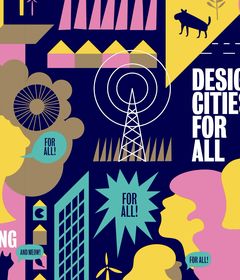The Designing Cities for All (DCFA) Student Book Club is a platform where students and designers(-to-be) can meet peers and explore different books related to design, cities and inclusivity. In the sixth edition of the DCFA Book Club, we dive deeper into Internet for the People: The Fight for our Digital Future by Ben Tarnoff and explore how we can create digital spaces that are democratic, safe and for all. After a kick-off followed by a month of reading, everyone will have the opportunity to ask questions and explore these topics with author Ben Tarnoff and DCFA Fellows de Chrononauten – who selected the book for this book club.
This programme will be subtitled live! To follow with live subtitles, click this link.

About the DCFA Book Club
In 2021, Pakhuis de Zwijger’s extensive two-year activity programme Designing Cities For All (DCFA) commenced with the support of the Creative Industries Fund NL. In the context of the super-diverse city, how can designers contribute to the creation of inclusive cities for, by and with everyone?
Next to many programme Fellows, designers, scientists, experts, educational institutions, and other involved partners, we dive into the matter of (re)designing inclusive cities together with a group of designers(-to be)/ students that we invite to our Book Club. This season, de Chrononauten takes on that task. They handpicked a thought-provoking book for students and young designers(-to-be): Internet for the People: The Fight for Our Digital Future by tech writer Ben Tarnoff — who will be joining us for a discussion about the book!
About the book Internet for the People: The Fight for Our Digital Future
In Internet for the People, leading tech writer Ben Tarnoff offers an answer. The internet is broken, he argues, because it is owned by private firms and run for profit. Google annihilates your privacy and Facebook amplifies right-wing propaganda because it is profitable to do so. But the internet wasn’t always like this — it had to be remade for the purposes of profit maximisation, through a years-long process of privatisation that turned a small research network into a powerhouse of global capitalism. Tarnoff tells the story of the privatisation that made the modern internet, and which set in motion the crises that consume it today.
The solution to those crises is straightforward: deprivatise the internet. Deprivatisation aims at creating an internet where people, and not profit, rule. It calls for shrinking the space of the market and diminishing the power of the profit motive. It calls for abolishing the walled gardens of Google, Facebook, and the other giants that dominate our digital lives and developing publicly and cooperatively owned alternatives that encode real democratic control. To build a better internet, we need to change how it is owned and organised. Not with an eye towards making markets work better, but towards making them less dominant. Not in order to create a more competitive or more rule-bound version of privatisation, but to overturn it. Otherwise, a small number of executives and investors will continue to make choices on everyone’s behalf, and these choices will remain tightly bound by the demands of the market. It’s time to demand an internet by, and for, the people now.
About de Chrononauten
de Chrononauten is a collective consisting of two futurologists, Edwin Gardner and Christiaan Fruneaux, who have been researching our era for more than ten years. In the ‘Atlas of the Long Now’ they interpret our rapidly changing world from the perspective of the great history, the long now and the deep future. If we stretch the moment we think we live in to decades, centuries, and even millennia – what do we see?
Apply for the DCFA Book Club
We still have some spots left for young designers(-to-be)/students who are working towards making cities more fair and inclusive. Each one of you will be gifted a hardcopy edition of Internet for the People for you to keep.
Sign up here to get your free copy of the book (as long as our stock lasts)!










